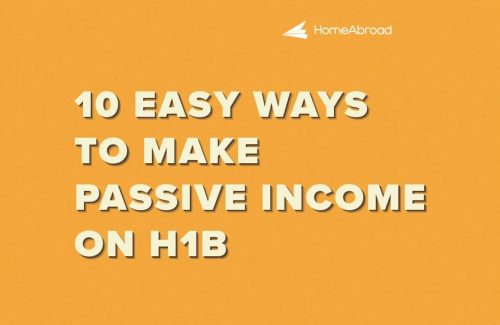Editorial Integrity
Moving to the US can feel overwhelming, filled with unknowns and uncertainties. HomeAbroad editorial team includes certified immigration experts/USCIS nerds who translate complex legalese into clear, actionable moving and visa guides. Rest assured, every article undergoes a reader-centric editorial process to ensure accuracy and reflect current regulations.
If you’re an international professional working in the US on an H1B visa, you might look for ways to grow your wealth beyond your salary. The good news? You can legally earn passive income without risking your visa status. While immigration laws prevent you from engaging in unauthorized employment, innovative and lawful ways exist to generate extra income.
Having worked with many H1B professionals over the years, I understand the challenges of balancing financial growth with immigration restrictions. The key is knowing what’s allowed and what isn’t to earn passive income without hindering immigration laws.
In this guide, I’ll explain legal and effective passive income strategies for building financial independence while fully complying with US regulations.
Table of Contents
Can H1B Holders Have Passive Income?
Yes, H-1 B visa holders can earn passive income, and there are no specific restrictions. However, ensuring full compliance with US tax laws and regulations related to passive income is essential.
While passive income is permitted, H-1 B visa holders must maintain their primary employment and meet all visa requirements. Any income-generating activities must not involve active work or services beyond what the visa permits.
By understanding the legal framework and choosing appropriate investment strategies, H-1 B holders can build passive income while complying with US immigration laws.
How to Earn Passive Income Legally on an H1B Visa
As an H1B visa holder, your employment is tied to your sponsoring employer, but that doesn’t mean you can’t grow wealth through smart investments. While actively running a business is restricted, several passive income strategies can help you earn without violating visa regulations.
Having worked with many H1B professionals over the years, I’ve seen firsthand how important it is to build financial security beyond a paycheck. The right passive income strategies can help you grow wealth while maintaining full-time employment and complying with immigration laws.
Now, let’s explore some investment and business opportunities to help you build a passive income on an H1B visa.
1. Invest in Real Estate, Including Rental Properties, REITs, and Crowdfunded Platforms
H-1B visa holders can legally purchase investment properties in the US without restrictions, making real estate an excellent option for passive income. Unlike traditional jobs, real estate investments allow you to earn money without working daily, primarily through rental income or property appreciation over time.
One way to invest is to buy a rental property, which means purchasing a house or apartment and renting it out. You can manage the property or hire a company to handle tenants, maintenance, and rent collection.
Another option is investing in Real Estate Investment Trusts (REITs), which function like stocks. By purchasing shares in a REIT, you earn money from the rent paid by tenants of commercial or residential properties owned by the trust. This option allows for real estate exposure without the responsibilities of property ownership.
For those looking for a lower-cost entry, crowdfunded platforms like Fundrise allow investors to pool their money together to purchase sizeable real estate assets. This approach enables fractional ownership, meaning you can invest less capital while earning a share of the profits.
The average annual return on real estate investments is around 8%, but it varies based on location and market conditions.
Tax Implications
Real estate remains a substantial passive income option, but it’s essential to research market conditions and tax obligations before investing.
2. Invest in Dividend-Paying Stocks, Mutual Funds, or ETFs
Investing in dividend-paying stocks, mutual funds, or exchange-traded funds (ETFs) allows you to become a part-owner of companies that distribute a portion of their profits as dividends. This strategy can provide a steady income stream without selling your shares. Mutual funds and ETFs pool money from multiple investors to invest in diversified portfolios of stocks, with some focusing specifically on dividend-paying companies.
The average annual dividend yield for such investments typically ranges from 2% to 5%, depending on the specific stocks or funds chosen. The FTSE All-World High Dividend Yield Index, which tracks global companies with high dividend yields, reported an average yield of 3.7% at the end of 2024.
However, it’s essential to recognize that investing in these financial instruments carries inherent risks, including potential loss. Market volatility, economic downturns, and company-specific issues can all affect the value of your investments and the dividends you receive. Therefore, thorough research, diversification, and consultation with a financial advisor are recommended before making investment decisions.
Tax Implications:
Investing in dividend-paying stocks, mutual funds, or ETFs can offer a reliable income stream, but it’s crucial to understand the associated risks and tax implications. Staying informed and seeking professional advice can help you make sound investment choices aligned with your financial goals.
3. Participate in Peer-to-Peer Lending Platforms
Participating in peer-to-peer (P2P) lending platforms allows individuals to lend money directly to borrowers, bypassing traditional financial institutions. As an H-1B visa holder, you can use these platforms to earn passive income through the interest paid on your loans.
How P2P Lending Works:
The average annual return for P2P lending typically ranges from 3.5% to 7.5%, depending on the platform and the risk profile of the loans. However, recognizing the inherent risks, such as potential loan defaults or delayed repayments, is crucial, as these could impact your returns.
Tax Implications:
As an H-1B visa holder, your tax obligations depend on your residency status, which is determined by the substantial presence test. If you meet this test, you’re considered a resident alien for tax purposes, and your worldwide income, including interest from P2P lending, is subject to US taxation.
Given the complexities of tax regulations and potential changes, it is advisable to consult with a tax professional to ensure compliance and optimize your tax situation.
P2P lending can be a viable way to earn passive income as an H-1B visa holder. However, it’s essential to thoroughly understand the associated risks and tax implications before participating in such platforms.
4. Online Businesses and Affiliate Marketing
Affiliate marketing allows you to earn commissions (1%-20%) by promoting products through unique blog links, social media, or websites. If someone purchases through your link, you earn a commission. Similarly, e-commerce and dropshipping via platforms like Shopify enable selling products online without holding inventory. Potential earnings range from $100 to $10,000+ per month, depending on marketing strategies and demand. However, success requires effort, consistency, and audience-building.
Tax Implications
Affiliate marketing and e-commerce income are self-employed and subject to federal, state, and local taxes. Self-employment tax includes Social Security and Medicare contributions. H-1B visa holders classified as resident aliens must report worldwide income on IRS Form 1040.
Transparency is essential; disclose affiliate links to your audience to comply with legal requirements and maintain trust.
This means the individual must pay self-employment taxes, including Social Security and Medicare. The standard deduction has increased to $15,000 for singles and $30,000 for married couples.
H-1B visa holders can own a business, but cannot actively manage or work for it without proper work authorization (EAD). Engaging in unauthorized employment can jeopardize visa status. Consulting an immigration attorney is recommended to ensure compliance.
5. Create and Sell Digital Products or Online Courses
For H-1B visa holders with an Employment Authorization Document (EAD), creating and selling digital products or online courses can be a great way to generate passive income. This method allows you to monetize your knowledge and skills by developing content such as e-books, audiobooks, or video courses.
You can sell these products on platforms like Udemy, Teachable, and Amazon Kindle, which offer access to large audiences. While this approach requires time and effort to create high-quality content, it can yield significant returns. Some successful creators have reported earning over $10,000 per month, but individual results vary depending on niche selection, marketing efforts, and audience engagement.
Tax Implications
Income earned from selling digital products or online courses is taxable and must be reported on your tax return. H-1B visa holders who are classified as resident aliens for tax purposes typically report this income on Form 1040, the US Individual Income Tax Return.
The amount of tax owed depends on factors such as total income, applicable deductions, and tax credits. Accurate financial records of all sales and expenses are essential to ensure compliance and optimize tax deductions.
6. Participate in a Dividend Reinvestment Plan (DRIP)
A Dividend Reinvestment Plan (DRIP) allows investors to reinvest their dividends into additional shares of stock rather than receiving cash payouts. Over time, this helps investors compound their returns and accumulate more shares, potentially leading to higher future dividends.
This is a long-term wealth-building strategy, particularly for investors focused on dividend-paying stocks. However, as with any investment, there are risks, and market fluctuations can affect overall returns.
Tax Implications
Even if dividends are reinvested through a DRIP, they are still considered taxable income in the year they are received. Investors must report reinvested dividends on their tax returns, just as they would for cash dividends.
Dividend income is reported on Form 1040 for H-1B visa holders considered resident aliens for tax purposes. Maintaining detailed records of all reinvested dividends is crucial for accurately calculating cost basis when selling shares, which affects capital gains tax calculations.
Consult with a tax professional familiar with non-immigrant visa holders to ensure compliance and optimize tax strategies.
7. Invest in High-Yield Savings Accounts or CDs
High-yield savings accounts and Certificates of Deposit (CDs) are secure avenues for earning interest on your savings. High-yield savings accounts function like regular ones but offer higher interest rates, allowing your money to grow more quickly. On the other hand, CDs are time-bound deposits where you commit your funds for a period ranging from a few months to several years, in exchange for a fixed interest rate.
Current Interest Rates:
Tax Implications:
Interest earned from both high-yield savings accounts and CDs is considered taxable income by the Internal Revenue Service (IRS). Financial institutions typically issue a Form 1099-INT if you earn interest that exceeds $10 a year. However, all interest income must be reported, regardless of the amount.
This interest is taxed at your ordinary income tax rate. Importantly, even if you reinvest or leave the interest in your account, it’s still taxable in the year it’s credited.
While these investment options are low-risk, their returns may not always keep pace with inflation. Additionally, early withdrawal from a CD before its maturity date can result in penalties, potentially reducing overall earnings.
8. Participate in a Master Limited Partnership (MLP)
Master Limited Partnerships (MLPs) are publicly traded entities, primarily in the energy and natural resource sectors, that combine the tax benefits of partnerships with the liquidity of publicly traded securities. Investing in MLPs can provide substantial income through regular distributions.
Potential Returns:
MLPs often offer attractive yields, averaging between 6% and 8%. However, these returns can fluctuate based on the specific partnership and prevailing market conditions.
Tax Implications:
Income from MLPs is taxed differently from traditional dividend income. Investors receive a Schedule K-1 form detailing their share of the partnership’s income, deductions, and credits. A portion of MLP distributions is often considered a return of capital, deferring taxes until the investment is sold. However, this also reduces the investor’s cost basis, potentially leading to higher capital gains taxes upon sale.
MLPs can be complex investments with unique tax reporting requirements. It’s advisable to consult with a tax professional to navigate these intricacies effectively. Additionally, MLPs are subject to market risks, and their performance is often tied to the volatility of the energy sector.
9. Buy and Hold Fixed-Income Securities or Bond Funds
Investing in fixed-income securities, commonly known as bonds, involves lending money to corporations or governments in return for periodic interest payments. Holding individual bonds or investing in bond funds allows you to build a diversified portfolio, potentially offering a steady income stream with generally lower risk than equities. However, selecting bonds or bond funds that align with your risk tolerance and investment objectives is crucial.
Historically, the Bloomberg US Aggregate Bond Index, which tracks investment-grade bonds, has provided varying returns. From 1976 to the present, it has achieved an average annual return of 6.7%. However, over the past 10 years, the mean annual return has been approximately 1.6%, reflecting the impact of prevailing low interest rates.
Tax Implications
Bond interest income is typically subject to federal income tax in the United States. Additionally, state and local taxes may apply, depending on the bond issuer and your residency. It’s important to note that bond prices move inversely to interest rates; thus, if interest rates rise, the market value of existing bonds may decline, potentially affecting your investment’s value.
10. Invest in a Dividend ETF (Exchange-Traded Fund)
Dividend ETFs are investment funds that hold a collection of dividend-paying stocks, offering investors exposure to companies that regularly distribute a portion of their profits. Investing in a dividend ETF allows you to receive periodic dividend payments proportional to your shareholding, providing a potential steady income stream. However, like all equity investments, dividend ETFs carry inherent market risks and can fluctuate in value.
As of recent data, the dividend yields of top high-dividend ETFs vary. For instance, the Nuveen ESG Dividend ETF (NUDV) offers a yield of 5.89%, the Global X SuperDividend US ETF (DIV) provides 5.00%, and the SPDR Portfolio S&P 500 High Dividend ETF (SPYD) yields 4.16%. These yields can fluctuate with market conditions and the specific holdings of each ETF.
Tax Implications
Dividends received from ETFs are generally taxable and may be classified as qualified or non-qualified, each subject to different tax rates. Qualified dividends are taxed at the lower long-term capital gains rates, while non-qualified dividends are taxed at ordinary income rates. Additionally, ETFs are subject to market risks, and the value of your investment can fluctuate with market performance.
Also Read: How to Generate Passive Income as an F1 Visa / OPT International Student?
Even with H-1B visa restrictions, you can legally build passive income through investments, real estate, and digital businesses. The key is choosing hands-off options that don’t require active participation.
Which of these methods interests you the most? Let’s discuss how to get started!
How to Start Your Own Business as an H-1B Visa Holder?
Due to updated regulations, starting a business as an H-1B visa holder in 2025 is now more feasible. While this path is possible, necessary legal and compliance steps must be taken to ensure proper sponsorship and visa maintenance.
Key Factors to Consider
- Self-Sponsorship Allowed: H-1B holders can own 100% of a business but must establish an employer-employee relationship (e.g., a board with authority to “fire” them).
- Business Eligibility: The company must be legally registered, have an IRS tax ID, and offer a specialty occupation role related to the owner’s degree.
- Costs & Compliance: Filing fees range from $2,000 to $11,000, and initial H-1B approval lasts 18 months, with possible extensions.
Benefits and Risks of Building Passive Income as an H-1B Visa Holder
Building passive income can be a smart financial strategy for H-1B visa holders, providing additional earnings and long-term wealth accumulation. However, US immigration laws impose restrictions on the types of income H-1B holders can earn, making it crucial to choose legally compliant strategies.
Below is a breakdown of the benefits and risks associated with passive income opportunities for H-1B holders.
Benefits | Risks |
|---|---|
Diversified Income: Helps supplement salary and reduce reliance on a single job. | Visa Restrictions: H-1B visa holders are generally limited to income from their sponsoring employer. Some passive income sources may violate visa terms. |
Wealth accumulation: Long-term investments like stocks, REITs, and index funds can help grow wealth over time. | Initial Time & Capital Investment: Many passive income strategies require an upfront investment of money, time, or skills. |
Flexibility: Some sources, like dividend investing, YouTube channels, and digital products, provide income without active involvement. | Market Volatility: Investments in stocks, real estate, or crypto can fluctuate, impacting expected returns. |
Scalability: Digital assets (e-books, courses, apps, YouTube) can generate revenue without increasing workload. | Legal & Tax Implications: Some passive income activities might have tax consequences or require specific business structures. |
Real Estate Potential: House hacking (renting part of a home) is a common way H-1B holders can generate income while living in the US. | Regulatory Compliance: Certain activities, such as running a business or freelancing, may require a change in visa status (e.g., from an H-1 B to an O-1 or EB-5 visa). |
Technology-Driven Growth: Online content creation (YouTube, blogs, courses) and digital product sales have become significant sources of passive income. | Income Variability: Passive income sources, such as ad revenue from content, can be inconsistent. |
Legal Requirements for Passive Income on an H1B Visa
Earning passive income as an H1B visa holder is possible, but strict legal and tax compliance is essential to avoid violating visa conditions. Here are the key points to keep in mind:
1. Passive Income vs. Active Income
2. Work with Immigration and Tax Experts
Consulting immigration attorneys helps ensure compliance with visa regulations. Tax professionals can assist with proper tax filings and avoiding legal complications.
3. Tax Identification & Reporting
4. Stay Updated on Regulations
IRS and immigration rules may change, so regular consultation with experts is crucial. Misreporting income or engaging in unauthorized work can lead to visa revocation or legal consequences.
By following these guidelines, H-1 B visa holders can legally earn passive income without risking their visa status.
Start Building Passive Income on an H1B Visa the Right Way
Building passive income on an H-1 B visa can enhance financial stability but requires careful planning. Be mindful of tax obligations, regulatory risks, and legal limitations. Follow these tips to maximize success, totally legally and effectively:
Using a strategic approach, H1B visa holders can build sustainable passive income without risking their visa status.
FAQs
Can I freelance or work as an independent contractor on an H-1 B visa?
You can work as a freelancer or independent contractor on an H-1 B visa, but you must obtain the necessary approvals and authorizations from USCIS.
Can an H1B earn foreign income?
Yes, H-1 B visa holders can earn foreign income while working in the US, as long as they comply with all US tax laws and regulations governing foreign income. However, the US does have tax treaties with many countries that can help to reduce or eliminate double taxation.
Is it illegal to work two jobs on an H1B?
H1B visa holders can work multiple jobs in the US under certain circumstances.
If an H-1B visa holder wants to work a second job, they must obtain approval from the primary employer who sponsored their H-1B visa. The H1B visa is tied to the specific employer who sponsored it, and the visa holder must continue to work for that employer to maintain their visa status.
Can an H1B start a side business?
Yes, H1B visa holders can start a side business in the US. However, specific rules and regulations must be followed to comply with US immigration and labor laws.
1. Obtain approval from your primary employer before starting a side business.
2. Comply with US labor laws if the side business involves providing services or labor.
3. Ensure that the side business does not interfere with your ability to perform your primary job duties.









![How to Buy a House on an H1B Visa [2026]](https://homeabroadinc.com/wp-content/uploads/2021/08/BuyingonH1BVisa-scaled.jpg)











